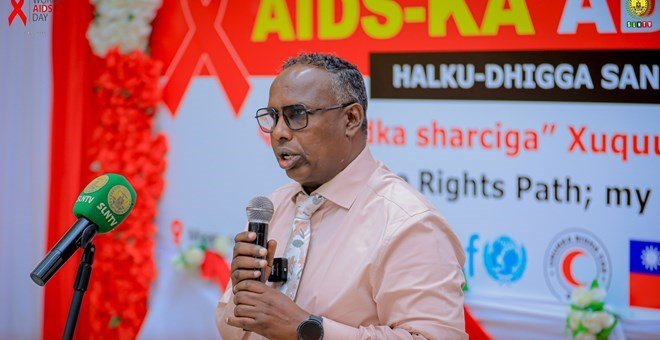Monday 2,Dec,2024{HMC} The Ministry of Health in Somaliland has strongly dismissed a report by Hargeisa General Hospital that suggested an alarming rise in AIDS cases over the past two decades. Health officials have called the data inaccurate, unauthorized, and potentially harmful, emphasizing that the nation’s HIV prevalence remains low and is steadily declining.
The disputed report claimed that between 2004 and 2024, a total of 3,206 people were diagnosed with HIV/AIDS in Somaliland. Of those, 2,481 patients received antiretroviral therapy, while 725 did not seek treatment due to personal reasons. The report also noted that in 2024 alone, 714 individuals were tested for the disease, with 103 cases confirmed, including 64 women and 39 men.
Director General of the Ministry of Health, Dr. Mohamed Abdi Hergeye, addressed the issue during a World AIDS Day event in Hargeisa, where he urged the public not to panic. “The public should not be misled by unauthorized information. The hospital does not have the mandate to issue such reports,” Dr. Hergeye said.
Dr. Hergeye refuted these findings, asserting that Somaliland’s official data shows only 0.15% of the population is affected by HIV/AIDS. “Our efforts have significantly reduced the prevalence of HIV. It’s vital that we rely on verified data to maintain public trust and avoid unnecessary fear,” he added.
Somaliland began offering antiretroviral therapy in 2005 and has steadily expanded its response to the HIV epidemic. As of 2021, 1,868 people were living with HIV in the region, with 193 new cases reported that year. Public health initiatives have included free testing, treatment programs, and education campaigns to reduce stigma and promote prevention.
Despite progress, challenges persist. A 2017 demographic survey revealed that nearly half of Somaliland women aged 15-49 held discriminatory attitudes toward people living with HIV/AIDS, highlighting the pervasive stigma that continues to hinder testing and treatment. In 2011, for instance, only 2.7% of women of reproductive age in Somaliland had been tested for HIV, according to a study published in the International Journal of Scientific and Engineering Research.
The rejection of the Hargeisa General Hospital report is not the first time the Ministry has dismissed alarming claims about HIV prevalence. Earlier this year, health officials refuted statements from a police official who alleged an increase in infections. The Ministry stressed that only data from authorized sources should be trusted.
As Somaliland observes World AIDS Day, officials are urging institutions to work collaboratively with the Ministry to ensure accurate and transparent communication on health matters. “We cannot afford to let misinformation derail the progress we’ve made in addressing HIV/AIDS,” Dr. Hergeye said.
Somaliland remains committed to reducing HIV prevalence, safeguarding public health, and fostering a society free of stigma and discrimination. With continued efforts, the region aims to further diminish the impact of HIV/AIDS and improve the lives of those affected.
Source Hiiraan online



